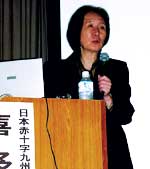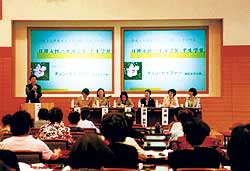![]()
NWEC National Exchange Festival 2003
|
From November 7 to 9, 2003, the National Women's Education Center (NWEC) held "WEC National Exchange Festival 2003" for organizations and groups that provide lifelong learning programs to achieve a gender-equal society. Almost 700 people participated in this festival. This year's theme was "Let's gather, discuss and form a circle - Aiming at a gender-equal society.・From the viewpoint of international cooperation, Professor Estuko Kita at the Japanese Red Cross Kyushu International College of Nursing delivered a lecture titled "Girls, I met at a refugee camp: What they can do now as Afghan women."The festival had thematic discussions on international cooperation. Some public-subscription-based free programs focused on international understanding/cooperation, such as situations or supportive measures surrounding African or Afghan women. The participants actively interacted with each other and built human networks over these three days. |
 Prof. Kita gives an energetic speech concerning Afghan women. |
Open Symposium on Lifelong Learning for Japanese and Korean Women
|
The National Women's Education Center (NWEC) conducted a joint research program in collaboration with the Korean Women's Development Institute (KWDI) from FY 2000 to FY 2003. On June 27, 2003, NWEC held the open symposium "Lifelong Learning for Japanese and Korean Women: For Self-Development and Social Participation" to deliver outcomes of the joint research program. In this symposium, participants actively exchanged their viewpoints on differences and common points between Japanese and Korean lifelong learning programs for women. The symposium revealed that lifelong learning provides opportunities for women's self-development but there are still some problems in making use of women's acquired abilities in economic and social activities. |
 Prof. Emeritus Chung Sei-Wha of Ewha Womans University, serves as the mediator between Japanese and Korean members and provides comments. |
"Gender Statistics Databook 2003 - Women and Men in Japan"
In August 2003, the National Women's Education Center (NWEC) released the "Gender Statistics Databook 2003." This databook outlines a two-year-long gender statistical survey from FY 2001 and illustrates 12 areas: "Population," "Family structure and household," "Labor force and employment," "Working conditions," "Livelihood time, charge-free working and leisure activities," "Household budgets and assets," "Education and learning," "Social security and social welfare," "Health and healthcare," "Security, crime and violence," "Decision making" and "Consciousness survey." The databook also has a glossary, website information, chronological table and other related resources. More detailed data are available at the "Gender Statistics Database" on the NWEC's website (Japanese only).
(NWEC's website: http://www.nwec.jp)
Enhancement and Strengthening of Systems to Handle Complaints with regard to Measures and Providing Relief for Victims of Human Rights Infringements
After examining possible enhancement/strengthening of systems for handling complaints with regard to measures and for providing relief to victims of human rights infringements, the Specialist Committee on Monitoring and Handling Complaints, Council for Gender Equality, reported its examination result to the Council for Gender Equality in October 2002. Based on this examination result, the Council adopted its opinion report.
In terms of handling complaints about government policies, the opinion report recommends supportive measures for 1) establishing a proper framework for compliant handling systems and strengthening collaboration among the related organs, and 2) improving counselor's knowledge/skills and energizing counselor's activities. As for providing relief to victims of human rights infringements, the opinion report describes supportive measures for 1) enhancing collaboration among organizations involved in victim's relief and establishing more effective regional support systems, and 2) improving the knowledge/skills of the persons in charge of victim's relief as well as energizing their activities.
In line with this opinion report, the Cabinet Office compiled the "Compliant Handling Guidebook" in January 2004, to describe the importance of compliant handling, the comprehensive perspective for compliant handling, points to keep in mind for complaint handling, and actual compliant handling examples. The Cabinet Office plans to promote the measure by distributing this guidebook to the related organizations and officials, such as grievance organs at the local- and central-government level, MPMHPT (Ministry of Public Management, Home Affairs, Posts and Telecommunications) counseling organs, administrative counselors, and human right protection officers.
Monitoring of the Implementation of Measures to Promote the Formation of a Gender-equal Society
In FY 2002, the Specialist Committee on Monitoring and Handling Complaints, Council for Gender Equality, monitored implementation of measures deserving of special consideration regarding the "Collection, collation and provision of information related to gender equality" and examined future possible steps for encouraging steady and effective policy initiatives. Based on the survey results, the committee proposed 1) to identify gender as much as possible when collecting statistical data, and 2) to disclose gender data in providing survey results and to provide information as much as possible so as to enable men-to-women comparison and cross tabulation with gender, age-bracket and other major characteristics.
In FY 2003, the committee is monitoring current situation on official development assistance (ODA) policies including "Women in Development (WID) Initiatives" and compliance to the "Convention on the Elimination of All Forms of Discrimination against Women" from the viewpoint of government measures listed in "Contributing to the 'equality, development and peace' of the global community," which are important targets identified in the Basic Plan for Gender Equality.
Selection of Way of Lifestyle and Examination of Taxation, Social Security, and the Labor Market
The Council for Gender Equality established the Specialist Committee on Gender Impact Assessment and Evaluation that examines impacts of government policies on the formation of a gender-equal society.
The committee examines taxation, social security, and employment systems as examples of governmental programs and social customs that would give significant impacts on women's lifestyle selection. In December 2002, the committee compiled a report on "Lifestyle selection, taxation, social security, and the local labor market."
This report describes the basic direction of the reform of the each institutions and systems in a neutral viewpoint of people's lifestyle selection. For example, the report calls for a tax reform plan to reduce or abolish spouse tax credits for a husband who has a relatively low-income earning wife, paying due attention to adjusting people's tax burden in general. The report also recommends a pension reform plan to expand the employees' pension plan coverage to short-time workers as well.
In FY 2003, the committee puts emphasis on the examination of the employment system continuously and will release its report in 2004.
The Cabinet Office established the "Working Team on Impact Assessment" to examine more effective impact assessment approaches. In November 2003, the working team released its interim report on basic concepts, practicable examples, and points to be kept in mind for effective assessment. The working team seeks for new approaches and valuable opinions from the concerned organs in order to develop more effective assessment approaches.
Local Public Body Official Training Sessions and Gender Equality Young Leader Conference
Encouraging gender equality surely requires various efforts at the local government level as well as in the private sector. According to the Basic Law for a Gender-equal Society, the government should provide information and other necessary resources to support such efforts.
In FY 2003, the Gender Equality Bureau, Cabinet Office conducted "Basic Training" for local officials in prefectures and government designated cities, and "Policy Training" for director-level officials, as well as "Consultation Training" for management-level counselors working for Spousal Violence Counseling and Support Centers. To encourage and raise awareness toward a gender-equal society and stimulate nationwide efforts for achieving gender equality, the Bureau also held the "Gender Equality Young Leader Conference" for younger generations that are expected to take the leadership of local communities in the near future.
